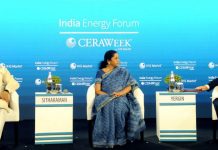India has been caught unawares as China brokered a truce between Iran and Saudi Arabia, who have been at loggerheads for decades, turning Middle-east diplomacy on its head.
The Chinese President, XI Jinping, anointed with a new five-year term has brought Iran and Saudi together after prolonged, secret and staggered parleys in the tricky Middle-East political churnings. He ushers in his new innings as a world statesman assuming a pivotal role in the realignment of the global power play this March.
The dragon is also now poised to bring Russia and Ukraine to a negotiating table for a ceasefire. China’s 12-point peace proposal is before Ukraine, and it could not dare to reject it so far. Earlier, Ukraine could afford to ignore the Indian peace proposals and its patrons in the West refused to sign a joint communiqué at G-20 in New Delhi recently. In the case of the peace proposals from Beijing, it knows if it rejects it, China would ensure unrestricted supply of lethal weapons to Russia to further pound Ukraine in the on-going conflict, which is 13-month old now.
In this latest peace offensive, the dragon has outwitted the bald eagle (USA), and the hapless elephant i.e. India is sidelined. In this repeat of the story narrated in the Aesop’s Fables, China has effectively assumed its Super Power role in the geo-politics.
Jinping has already qualified for the prelims of the high seat of diplomacy in the ongoing melodrama in the murky politics of Middle-East politics. With a renewed confidence, it begins with spectacular gains, while quietly engaging the concerned parties in behind the scene parleys till the outcome was reached. It appears, India was unaware of these diplomatic moves during February and March this year, while the détente between two perennial warring groups in the region, Saudi Arabia and Iran was being arrived at.
Beijing: New Power Centre
The rhetoric of G-20, and later the blunders committed at the Raisina Dialogue, have taken away much of the sheen of the international event. The buffoons sponsoring the Raisina Dialogue comprising Ambani’s think tank, Organizer Research Foundation (ORF) and the docile participants of the External Affairs Ministry (EAM) have not only undermined India’s vital interests, they have reversed 15-year old diplomatic efforts taken by the present Narendra Modi Government as well as the erstwhile regime of Dr. Manmohan Singh for having an effective Indian presence in the Middle-East.
The anguish of the faux-paus committed at the Raisina Dialogue expressed repeatedly by India’s veteran diplomat, Ambassador K.C. Singh is being shared across the country. He bemoans that the controversy generated by the ORF’s promotional video during the Raisina Dialogue showing protests in Iran over hijab or female head-covering, could have been avoided. It had led to the cancellation of the visit of the Iranian foreign minister Hossein Amir-Abdollahian to New Delhi giving a blow to the already sensitive ties between India and Iran. Within 10 days of his refusal to visit New Delhi, Hossein Amir-Abdollahian was seen signing the historical trilateral accord at Beijing among Saudi Arabia, Iran and China. Instead of making corrective steps, the propagandists in New Delhi cunningly manage a statement from the Iranian ambassador to India Iraj Elahi, “praising India that she is a rising power in the region and she will not tolerate American pressures etc.” It is yet to be ascertained what was the occasion for the statement of Elahi, but it is necessary for all of us to realize that such rhetoric cannot compensate for the geo-politics of the region. “The trilateral will only stiffen Iranian touchiness; they are difficult to handle at the best of times”, cautioned Singh.
Earlier, the Abraham Accords, which might have introduced a new US-sponsored Gulf security paradigm to isolate Iran, limiting its influence across the Shia crescent stretching from the western Iranian border to the Mediterranean, was signed. However, within a few months, the cheer leaders of the U2 group were overtaken with the trilateral accord happening at Beijing, thus shattering Biden’s grand dream of having a strong voice in the gulf politics.
The realists in New Delhi know that the region’s power fulcrum has now quietly shifted from White House to Beijing. China has emerged as the sole Super Power playing a key-role in shaping regional politics of this oil-rich region to suit its business as well as strategic interests.
India’s self-deception
Indian policy makers, except those who believe in their own false propaganda, know quite well that she is not yet powerful enough to play a crucial role on the global chess-board. She had been taking diplomatic efforts for the past several years, but self-acclaimed propaganda appears to have weakened the present government’s capacity to evaluate the sensitive strategic foreign policy issues. For India, it is a wake-up call. The “I2U2” now leaves India in a group isolated by the new Saudi-Iran-China convergence. Meanwhile, Israeli Prime Minister Benjamin Netanyahu’s aggressive right-wing coalition might bring Saudi and Iran much closer in coming years.
Chinese Impact
There could be two opinions regarding the Chinese peace initiative. As per one opinion, Jinping has taken forward the Abraham Accords initiated during the US President Donald Trump’s administration in 2020, as some Washington-based experts may like us to believe. Or secondly, it asserts Beijing’s new incarnation, a Super Power, with an olive branch, as the symbol of peace in the strife-torn region.
The Abraham Accords are a series of joint normalization statements initially agreed to between Israel, the United Arab Emirates (UAE) and Bahrain. It has been effective since September 15, 2020, following the initial announcement of August 13, 2020. On September 15, 2020, the official signing ceremony for the Abraham Accords was hosted by the United States at the White House as part of the dual agreements, both the UAE and Bahrain. Under this Accord, the two Arab countries recognized Israel’s sovereignty, thus paving the way for establishing full diplomatic relations. However, much will be depending upon Israel to make the accord successful.
The other high point in Jinping’s on-going diplomatic offensive is his 12-point peace initiative for ending the Ukraine-Russia War. It appears that China is going to arrive at a peace deal. Instead of going into the details of Russia’s invasion of Ukraine, China knows that the western powers are keen to get rid of the prolonged Russia-Ukraine conflict. The chairman of the Quincy Institute for Responsible Statecraft, Andrew Bacevich, describes the Russian invasion of Ukraine as a criminal act of great recklessness, which was similar to those of the American invasion of Iraq in 2003. Bacevich further adds that “Biden appears to believe that the Ukraine war provides a venue whereby the United States can overcome the legacy of Iraq, enabling him to make good on his repeated assertion that ‘America is back.”
It appears that in the contemporary play of the global power game, the traditional stories of Aesop’s Fables, continue to give us some insight of the complex power games believed to have been played in the animal world. Similar folklore can be found in the Indian classics too such as Pundit Vishnu Sharma’s “Panchtantra”, which are narrated to children like folklore even today.
These classics explain to us the nitty-gritty of diplomacy and the science of war and strategies to win over the enemy. Since the camel denotes the Arab world, the eagle represents the USA and India is often identified with its traditional elephants. Since 1772, the bald eagle has been the most admired bird in the USA. It now symbolises America. These symbols quite fit in contemporary diplomacy. China replays them on the high-table of the global power play, the camel is tamed, the eagle is silenced and indeed, the elephant is sidelined. It is to be seen whether India, the elephant will ever learn.
End of Pax Americana
The term Pax Americana is used to denote the American power in keeping peace since World War-II. The Russia-China strong alliance in recent weeks, however, has upset the American strategic calculations in the Middle-East. During this March, within two weeks of the peace accord reached between two estranged nations of Saudi Arabia and Iran in China, now a new détente appears to be on the cards between Syria and Saudi Arabia, under Russian supervision. The conflict is expected to end by next month, but the Americans are not even being consulted.












